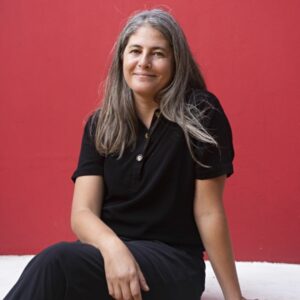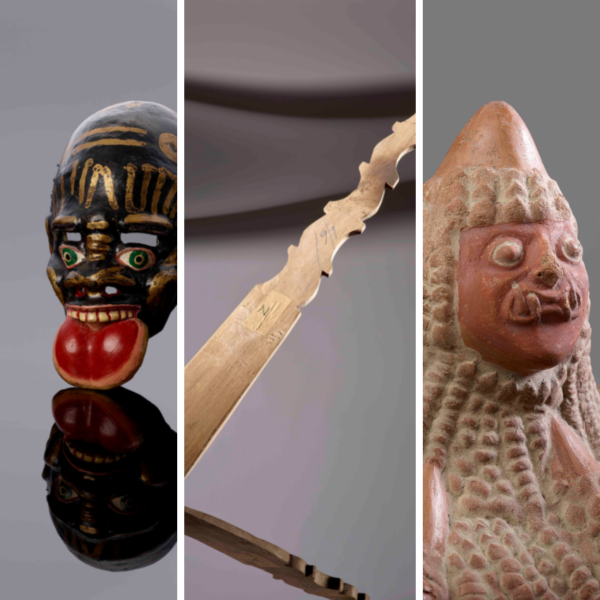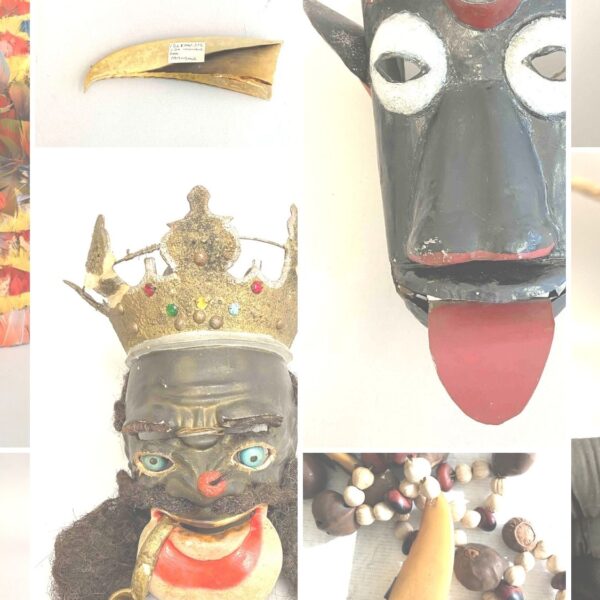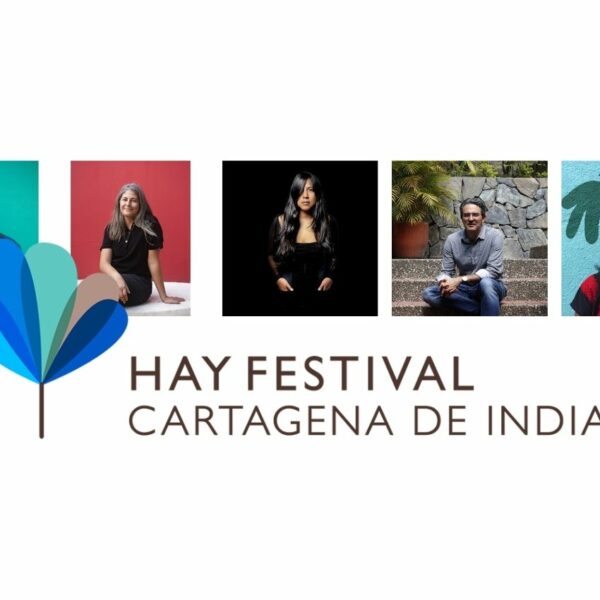Writers in the Archives of The British Museum
Following the spirit of Untold Microcosms, this book project with Hay Festival aims to explore unique aspects of museum collections from a literary perspective. Six writers were invited to engage with a rich archive of documents related to the Latin American and Caribbean collections in the British Museum.
Selva Almada (Argentina), Rita Indiana (Dominican Republic), Josefa Sánchez (Mexico), Philippe Sands (England), Juan Gabriel Vásquez (Colombia) and Gabriela Wiener (Perú) worked with a set of Museum archives known as ‘Ethnographic Documents’ or ‘Eth Docs’ for short. This miscellaneous collection ranges from early-nineteenth-century letters between curators, colonial officials and explorers to sketches, drawings, photographs, maps, newspaper cuttings and typewritten reports related to object acquisitions, expeditions, and archaeological excavations. Despite being public archives, these ‘Eth Docs’ remain mostly inaccessible and have been mainly consulted by researchers.
Each writer worked with SDCELAR curators to review a bundle of Eth Docs related to Latin America and the Caribbean and create compelling narratives that increase the visibility of this archive and the region. Whether fictional and non-fictional or written in prose or verse, the stories featured in the new anthology of Explorers, Dreamers and Thieves: Writers in the Archives of the British Museum, likewise express critical and creative concerns about the limits and possibilities of archives for interpreting and representing the social life of Latin American and Caribbean collections from the Museum, and their historical, cultural and the political dimensions.
By placing these Eth Docs at the centre of this next creative experiment, we intend to inspire narratives that connect with contemporary perceptions and social tensions. We believe these narratives can offer meaningful re–interpretations to these objects’ stories, in dialogue with today’s political contexts.
Publications
Two anthologies will be published in English (by Charco Press) and Spanish (by Anagrama) with the texts and images under the title Explorers, Dreamers, and Thieves: Writers in the archives of the British Museum. The stories in this anthology are prefaced by collages created by SDCELAR curators based on the materials used by the writers as visual compositions to give a sense of the meaning and materiality of the archives that inspired the stories.
The Anagrama edition will be launched at Hay Festival Cartagena 2024, where a series of talks will address the authors’ and curators’ experience working on this project. For more information, check the Hay Festival Cartagena full programme here.
EVENTS>> SEE THE HAY CARTAGENA 2024 TALKS ABOUT THIS PROJECT HERE.
The authors
Selva Almada
 © M. Cascallar |
(b. 1973, Entre Ríos, Argentina) Compared to Carson McCullers, William Faulkner, Flannery O’Connor, and Juan Carlos Onetti, Selva Almada is considered one of the most powerful voices of contemporary Argentinian and Latin American literature and one of the most influential feminist intellectuals of the region. She has published several novels, a book of short stories, a book of journalistic fiction and a film diary (written on the set of Lucrecia Martel’s film Zama). She has been finalist for the Medifé Prize, the Rodolfo Walsh Award and of the Tigre Juan Award. Not a River (winner of the IILA Prize in Italy) is her fourth book to appear in English after her debut The Wind that Lays Waste (Winner of the EIBF First Book Award 2019), Dead Girls (2020), and Brickmakers (2021, shortlisted for the Warwick Prize for Women in Translation and the Valle Inclán Prize). |
Rita Indiana
 © Creative Commons 3.0 |
(b. 1977, Santo Domingo, Dominican Republic) Dominican-born, Puerto Rico-based writer and singer-songwriter Rita Indiana is a key figure in contemporary Caribbean literature. Her second novel, Papi (Periférica, 2011), became a cult text since its first lines were made public: “Flow literature, syncopated reading, street poetry phrasing, amphetamine merengue cadence, and a strange taste of beat poetry filtered through magical realism” (Xavi Sancho, El País); “Rita Indiana constructs a narrative structure in Papi with the cadence of merengue and the gaze of a lonely girl who could be a cross between One Hundred Years of Solitude and Misery, and it ultimately becomes a pop novel, paying homage to popular culture not only Latin American but also North American” (Laura Fernández, El Mundo). Subsequently, her novels Nombres y animales (Periférica, 2013) and, above all, La mucama de Omicunlé (Periférica, 2015; Caribbean Writers Association Prize, 2017) established her as one of the most important contemporary Latin American writers. |
| Josefa Sánchez
|
(b. 1991, Zoque people of San Miguel Chimalapa, Oaxaca, Mexico) Mexican researcher, activist and essayist, Sánchez is a doctoral researcher in Mesoamerican Studies and Master in Latin American Studies at the National Autonomous University of Mexico. Degree in Sociology from the Universidad Autónoma Metropolitana. Co-author of the book Colonialismo energético (Icaira, 2023), coordinator of the book Cada vez más Mökayas, pensares y sentires de zoques contemporáneos (Ce-Acatl, 2022), her essays and articles can be read in The Washington Post in Spanish, La Ojarasca, La Jornada, the Revista de la Universidad de México and EstePaís. She writes about territorial defences, indigenous rights, history of rebellions and colonialism. In her activism, she is part of the Matza Collective, made up of young Zoques, from where she contributes to the defence of the rivers of the Chimalapas jungle against extractive open-pit mining megaprojects. In his academic work she is a member of the Laboratorio Investigación Acción Territorial at the University of Granada, Spain. |
Philippe Sands
 © Billie Charity |
(b. 1960, London, United Kingdom) British and French writer and lawyer, Sands QC is Professor of Law at University College London and a practising barrister at Matrix Chambers. He appears before many international courts and tribunals, including the International Criminal Court and the International Court of Justice. He is the author of Lawless World (2005) and Torture Team (2008) and several academic books on international law, and contributes to the New York Review of Books, Vanity Fair, the Financial Times and The Guardian. His latest book is East West Street: On the Origins of Crimes Against Humanity and Genocide, won the 2016 Baillie Gifford Prize (Spanish translation was published by Anagrama, October 2017). The book comes with a BBC Storyville film, My Nazi Legacy: What Our Fathers Did. He is a vice president of the Hay Festival and a member of the board of English PEN. |
| Juan Gabriel Vásquez
|
(b. 1973, Bogotá, Colombia) Vásquez is the author of the two books of short stories Los amantes de Todos los Santos and Canciones para el incendio (Biblioteca de Narrativa Colombiana Prize), and six novels: The Informers, The Secret History of Costaguana, El ruido de las cosas al caer (The Sound of Things Falling) (Alfaguara 2011, Grego von Rezzori-Città di Firenze Prize 2013, IMPAC International Dublin Literary Award 2014), Reputations (Royal Spanish Academy Prize 2014, Casa de Amèrica Latina de Lisboa Priza 2016), The Shape of Ruins (Casino de Póvoa Prize and finalist for the Man Booker International Prize) and Retrospective (Mario Vargas Llosa Biennal Prize). Vásquez has also published two books of literary essays, El arte de la distorsión and Viajes con un mapa blanco, a collection of political articles, Los desacuerdos de paz, and a collection of poems, Cuaderno de septiembre. In 2012 he received the Prix Roger Caillois and has twice won the Simón Bolívar National Journalism Prize. He has translated works by Joseph Conrad and Victor Hugo into Spanish. His books are currently published in 30 languages. |
Gabriela Wiener
 © Daniel Mordzinski |
(b. 1975, Lima, Peru) Wiener is a Peruvian writer and journalist based in Madrid who has published Sexografías, Nueve Lunas, Llamada perdida, Dicen de mí and the book of poems Ejercicios para el endurecimiento del espíritu. Her texts have appeared in national and international anthologies and have been translated into English, Portuguese, Polish, French and Italian. Her first stories were published in the Peruvian narrative journalism magazine Etiqueta Negra. She was editor-in-chief of Marie Claire magazine in Spain and a columnist for the New York Times in Spanish. Today she writes a column for eldiario.es and presents a video column in lamula.pe. She won her country’s National Journalism Award for an investigative report on a case of gender violence. She is the creator of several performances that she has staged with her family. She recently wrote and starred in the play “Qué locura enamorarme yo de ti“, directed by Mariana de Althaus. Her most recent book is the novel Huaco retrato. |


